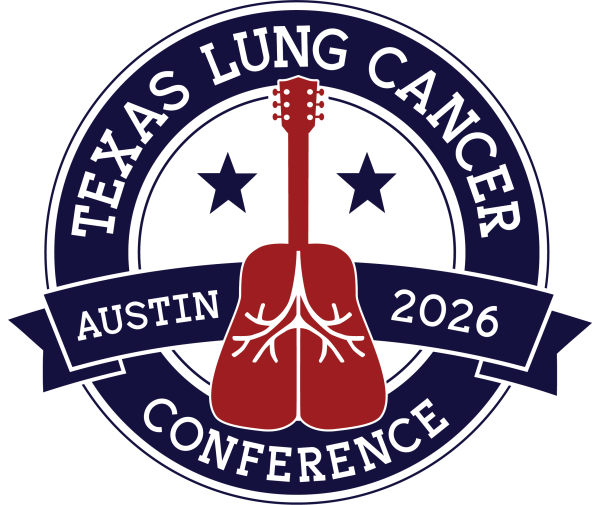
Overview
The 4th Annual Texas Lung Cancer Conference (TLC 2026) will convene over 100 leading national experts, rising faculty, and community oncologists for two days of CE-accredited, case-driven education in the heart of Austin. Designed for practicing physicians and multidisciplinary oncology professionals, the conference addresses the most pressing challenges and advances in lung cancer diagnosis, treatment, and patient-centered care.
Related Files
Upon completion, learners will be able to:
- Evaluate the impact of multidisciplinary care on outcomes in patients with early-stage non-small cell lung cancer (NSCLC)
- Describe current standards and best practices for biomarker testing in advanced NSCLC, including indications and interpretation of results.
- Assess and implement approved immunotherapy-based therapeutic options for the management of advanced NSCLC, considering patient and disease characteristics.
- Assess and utilize currently approved targeted agents for the treatment of advanced NSCLC, selecting appropriate therapies based on molecular profiling.
- Integrate and appraise novel and emerging therapeutic strategies for the management of small-cell lung cancer (SCLC) in clinical practice.
- Advanced NSCLC – Targeted Therapy Deep-Dives: EGFR (including exon 20), ALK, ROS1, NTRK/RET/NRG1, BRAF, MET, KRAS G12C, HER2 — with concise evidence updates followed by extended panel discussions featuring both academic and community experts.
- Immunotherapy in NSCLC: Long-term outcomes with chemo-immunotherapy, dual checkpoint inhibition, patient selection, and toxicity management — with a focus on integrating lessons learned into daily clinical decision-making.
- Small Cell Lung Cancer (SCLC): Evolving approaches in limited stage and extensive stage disease, relapse strategies, neuroendocrine tumors, and novel agents in the pipeline.
- Rare Thoracic Tumors: Mesothelioma, thymic cancers, and other uncommon malignancies —highlighting trial updates and treatment innovations.
- Emerging Therapeutic Modalities: Incorporating bispecific antibodies, antibody–drug conjugates (TROP2, HER2, VEGF/PD-1), tumor treating fields, and cell therapy into standards of care.
- Precision Diagnostics: NGS, liquid biopsy, minimal residual disease (MRD) assessment, and lung cancer screening — with emphasis on practical adoption barriers and solutions.
- Early-Stage & Locally Advanced NSCLC: Targeted therapy, immunotherapy, surgical considerations, and multidisciplinary case-based discussions to optimize curative-intent care.
- Tools for Tomorrow’s Oncologist: AI in thoracic oncology, statistical literacy for clinicians, patient advocacy, and health policy updates that shape oncology practice.
- Engaging Formats: Rapid-fire updates, interactive panels, structured debates, and non-CE breakfast/lunch symposia for deeper dives into key topics.
Upon completion, learners will be able to:
- Evaluate the impact of multidisciplinary care on outcomes in patients with early-stage non-small cell lung cancer (NSCLC)
- Describe current standards and best practices for biomarker testing in advanced NSCLC, including indications and interpretation of results.
- Assess and implement approved immunotherapy-based therapeutic options for the management of advanced NSCLC, considering patient and disease characteristics.
- Assess and utilize currently approved targeted agents for the treatment of advanced NSCLC, selecting appropriate therapies based on molecular profiling.
- Integrate and appraise novel and emerging therapeutic strategies for the management of small-cell lung cancer (SCLC) in clinical practice.
- Advanced NSCLC – Targeted Therapy Deep-Dives: EGFR (including exon 20), ALK, ROS1, NTRK/RET/NRG1, BRAF, MET, KRAS G12C, HER2 — with concise evidence updates followed by extended panel discussions featuring both academic and community experts.
- Immunotherapy in NSCLC: Long-term outcomes with chemo-immunotherapy, dual checkpoint inhibition, patient selection, and toxicity management — with a focus on integrating lessons learned into daily clinical decision-making.
- Small Cell Lung Cancer (SCLC): Evolving approaches in limited stage and extensive stage disease, relapse strategies, neuroendocrine tumors, and novel agents in the pipeline.
- Rare Thoracic Tumors: Mesothelioma, thymic cancers, and other uncommon malignancies —highlighting trial updates and treatment innovations.
- Emerging Therapeutic Modalities: Incorporating bispecific antibodies, antibody–drug conjugates (TROP2, HER2, VEGF/PD-1), tumor treating fields, and cell therapy into standards of care.
- Precision Diagnostics: NGS, liquid biopsy, minimal residual disease (MRD) assessment, and lung cancer screening — with emphasis on practical adoption barriers and solutions.
- Early-Stage & Locally Advanced NSCLC: Targeted therapy, immunotherapy, surgical considerations, and multidisciplinary case-based discussions to optimize curative-intent care.
- Tools for Tomorrow’s Oncologist: AI in thoracic oncology, statistical literacy for clinicians, patient advocacy, and health policy updates that shape oncology practice.
- Engaging Formats: Rapid-fire updates, interactive panels, structured debates, and non-CE breakfast/lunch symposia for deeper dives into key topics.
